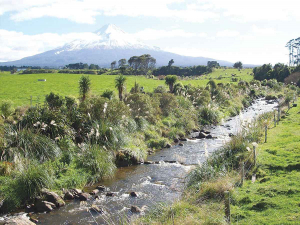Urgent action needed to restore Waikato lakes' health
Waikato is home to a diverse range of lakes, and experts say they urgently need better management and restoration.
 All existing Taranaki Regional Council riparian plan fencing can remain and will be accepted as compliant.
All existing Taranaki Regional Council riparian plan fencing can remain and will be accepted as compliant.
The Taranaki Regional Council is welcoming the Government’s revised stance on freshwater regulation.
Council chairman and former Fonterra director David Macleod says the revised Essential Freshwater reforms unveiled this month validates the serious concerns raised about its original proposals.
“We all want our waterways to be healthier – we share that goal with the Government,” says MacLeod.
“However, we had major concerns about the ability of the original proposals to deliver. We told Wellington their initial plans would have brought unpredictable and likely only marginal environmental benefits, but would have taken a very heavy toll on the social and economic well-being of this region and many others.”
MacLeod says the Government is now moderating its approach and seeking to build a more worthwhile, rational, science-based freshwater regulation regime.
“We’re still working though the details. But in general, this change of stance is to be welcomed. The council’s strong and evidence-based submissions were substantially agreed with and key changes made.”
Notably, the Government has delayed any decision on a key nutrient limits pending further analysis of their worth, rather than going ahead with strict limits that one study estimated would cost $100,000 each for up to a third of the region’s farms, threatening their viability.
It has also not proceeded with proposals to universally use OverseerFM in water regulations – the council strongly advised the OverseerFM model was not fit for that purpose.
“We’re delighted the Government agrees OverseerFM is best used as originally intended - for farmers to review and improve on-farm nutrient management,” MacLeod says.
The Government has also eased up on an initial proposal to impose a blanket 5m setback for all riparian fencing, saying now that 3m is the minimum.
Importantly for Taranaki, all existing council riparian plan fencing can remain and will be accepted as compliant, which the council strongly advocated for.
The Government has also backed off what would have been harsh constraints on dairying in the Waingongoro catchment, instead progressively targeting freshwater farm plans by which dairy farmers can implement farm-specific management to improve efficiency and reduce off-site effects.
Overall, MacLeod says it’s clear the Government has taken account of many of the points made in the council’s submission.
MacLeod says that Government was firmly reminded the Taranaki region has, over time, collectively demonstrated strong commitment to improving freshwater health, taking carefully considered long-term action and spending millions of dollars on interventions of proven effectiveness.
“If anything, the original proposals threatened to undo a lot of good work and goodwill and bring hardship and deprivation to communities engaged in productive and sustainable enterprise. We are still working through the amended proposals, but we’re encouraged that the voice of reason appears to have been heard, at least in part.
“We all know we have more to do in both our rural and urban areas, but Taranaki people know how to roll up our sleeves and keep moving forward – we’ve consistently led and shown New Zealand that it is not about endlessly changing plans, policies, meetings and paper – it’s on-the-ground actions that change and improve our environment.”
Mating wrapped up last month at the across-breed Beef Progeny Test on Pāmu’s Kepler Farm in Manapouri.
Libby Judson is a keeper of memories from an age gone by. Tim Fulton tells her story.
A New Zealand-first native tree study has highlighted the Bioeconomy Science Institute's position as a forestry research leader.
Hemp fibre processor Rubisco is relocating its core processing facility to Ashburton as part of a $20-$30 million expansion to leverage what it says is an accelerating global demand for sustainable and renewable fibres.
Tradition meets some of the latest in technology at the 2026 East Coast Farming Expo.
OPINION: Trade Minister Todd McClay and the trade negotiator in government have presented Kiwis with an amazing gift for 2026 - a long awaited and critical free trade deal with India.